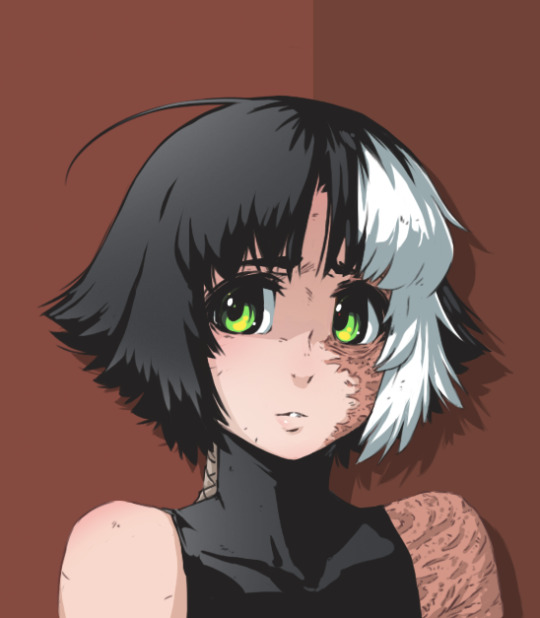#calabi yau forest
Explore tagged Tumblr posts
Text

"Clover" - Zealot of the Red Sun
Working in higher resolutions feels so uncomfortable. But will probably end up as a poster eventually. :>
3K notes
·
View notes
Note
Sticking his head into the tent, Drexod's eyes quickly adjusted to the gloom. Shushing the shanks, he padded in and sat down next to the cot. The Hunter could tell Ana had run herself into the ground and was asleep through exhaustion more than choice. "Orgulloso de ti, mi pequeño cazador," he murmured softly, placing a soft kiss on the girls head before making sure she stayed settled.
She only saw him in dreams and episodes of death and destruction. For years, the sky over her home was lurid red and choked with smoke and screams, her chest was clogged with desperation and despair, and she saw only the backs of her parents before the Fallen tore them to shreds.
Every day she fought off her living nightmare.
After almost a week of pushing herself without sleep, she had fainted on her beanbag with her nanoparticle laser tool in one hand and prototype sample in the other. Paco peeked out from behind her row of video games and beeped softly at Drex.
For the first time in years she saw his face. Papá opened the door of her house and she looked up, shielding her eyes from the blinding sun behind him. His deep, brown eyes held so much laughter and the ever-present salt and pepper scruff gracing his jaw rounded his face, made him seem quick to share joy somehow.
He looked once into her eyes and she felt her heart soar. She wanted so badly to reach out and touch him, grab him and make sure he was real. Instead, she wordlessly held up the items in her hands. There was a laser tool of some kind, she wasn’t sure what, but she knew it manipulated the object she had made in her other hand: a cloth of nanotube chainmail, that changed into a sample of her tapping into infinite gravity using the Randall-Sundrum theory, that changed into the one true Calabi-Yau manifold that hid the bulk of the universe from human senses.
He grinned at her work and somehow, with the door closed, she felt the sun warm her face.
Even with the truth of the universe in her hands, the overpowering urge to throw her things to the floor and leap into his arms flooded her small body. She opened her mouth to speak but no sounds came. Te amo! Her mind screamed. Te amo! Te amo, papá! She wanted to cry, she wanted to scream the words until her voice ran hoarse, she fought against her unresponsive body and merely stood and stared into his perfect face for the first time in what seemed to be an eternity.
He leaned down and kissed her forehead, gifting her with his summertime warmth and bad jokes and all the times he laughed in all the wrong moments and breakfasts when the morning was still chilly and toys and books and games and machines he brought from the traders and mercs... all of those small days, a flash in the lifespan of the universe, a flash much briefer than most. She had no time to truly understand him, no time to grow alongside the best man she had ever known, and scarcely had time to blink.
“Orgulloso de ti, mi pequeño cazador,” he murmured softly.
Those words, that voice... she had not heard that voice in ages. She felt a deep ache in her chest. She felt her shoulders lighten.
Everything was going to be okay.
Their silence was broken by the day to day business and livelihood of her little hometown, nestled in the chirring mountain forest of Peru. Someone shouted about their wares. Daily chatter rolled on the lazy, warm breeze. She heard the trees sway and the clinking bells of a marching goat herd in the distance. Home. Her home.
Everything was going to be okay.
Fans droned tirelessly in her warm tent in Guyana. Ana’s chest rose and fell noiselessly as she slumbered. She gave no reaction to her visitor - indeed, she had no energy to spare for such. And for the first time in many days, she slept soundly, safe beside her friend and ally, safe from the troubles of the world, and lay adrift in the universe.
2 notes
·
View notes
Photo

Nadia of 'Calabi Yau Forest' by ALF874
5 notes
·
View notes
Text
Ode to Hushabye Valley – Notes
Sweet and sincere; apropos for the good lady @hushabyevalley whose art inspired it, I should hope. Here’s the usual note that accompanies most of my poetry, and I must apologise: it’s long and while I would be overjoyed if one were to read it, I do realise it’s not particularly interesting. Nonetheless, I would like to explain the hows and whys of a dedicatory poem, so if you want to understand all the allusions of the poem, please read the bit up till the second line of ‘===’s. Under those will be a more technical look into the workings of the poem. If you happen to stick with me from start to finish, then you have my sincerest thanks :) === So, the poem begins with an invocation to Hushabye, the eponymous lady of both the fantastical valley and the castle that is situated therein. Please visit the good lady here or here. Now, world-building is a fundamental aspect of high fantasy and science-fiction, and the world of Hushabye Valley is, at least to me, one that is suffused with romance, timelessness, fantasy, and quiet pathos,– something which I find in all three of the good lady’s ‘tales’: Hushabye Valley (fantasy), Calabi Yau Forest (fantasy), and Ada (sci-fi, but otherwise suffused with the same charm as the others). While the combination is becoming far more popular these days, high fantasy and slice-of-life are not related genres traditionally, as high fantasy is predominantly preoccupied with grand narratives and quests (think C. S. Lewis or J. R. R. Tolkein) while slice-of-life is focused on the memorable moments of everyday life. I find the good lady makes them work wonderfully well, hence the rather odd turn of phrase in ‘complete with beauty, mild and grand’. ‘Mild and grand’ are not cognate ideas, but by placing them both as interlinked qualities of a singular ‘beauty’, it (hopefully) suggests the all-encompassing nature of the splendours that Hushabye portrays in the valley. Puns and allusions are important in an ode of this kind: in a celebratory poem, it should be evident to the addressee exactly what it is that they have done or created that has garnered said praise. In equal measure, if one is sincere about one’s praise or admiration, one’s writing should show a certain amount of knowledge and love of that which is spoken. Some of these are, admittedly rather straightforward, such as ‘misty’, which alludes to the good lady’s tumblr ask: ‘Throw a question into the mist’; ‘a face of marble’, to the rather adorable groundskeeper and main character of Hushabye Valley, Marble; and ‘the archways of a bygone year’, to the banner of Hushabye Valley’s Patreon page. The last one is a little tenuous, if I had to be honest, as the emphasis in the banner is on the four plinths that flank Marble, but I felt ‘archways’ scanned better poetically than ‘plinth’. If I had to use ‘plinth’ instead, I’d have rewritten the line as a hexameter one thus: “Between the plinths engraved with words long worn away;” ‘Queer’ is another word I chose due to its double meaning, due to both its more traditional sense of strange or unusual,– and thus apropos to describe the faerie aspect of Hushabye’s ‘tales,– as well as the presence of yuri/girls’ love therein. I do realise that queer is a complicated word today, but I hope the phrase ‘love sincere’ dispels any doubts regarding which side of the fence my sympathies sit regarding the matter. The word ‘art’ ties into the idea of magic and fantasy as magic, like alchemy, was considered a branch of learning historically, and thus described in the same way we would talk about liberal arts. Of course, Hushabye herself is an accomplished artist of the visual kind, making this another fairly straightforward piece of wordplay. ‘Enfold me in your art’ is just something that I ask of good narratives: I like being immersed in something if I sincerely enjoy it. This ties into the last line and my word choice therein. Castle Hushabye is ‘a fonder home’ to the speaker of the poem, and it’s important to note the use of ‘fonder’ quite specifically. ‘Fonder’ is a comparative adjective, and when considered alongside the context of the speaker, who is evidently a traveller, it suggests that home or haven offered by Hushabye is a place that the speaker finder more loving (not merely lovely) than wherever the speaker originated from. Considering the state of the world today, I would happily escape into the good lady’s worlds and narratives and stay there. While reading, I am reminded of one of Tennyson’s lyric interludes from The Princess: The splendour falls on castle walls And snowy summits old in story: The long light shakes across the lakes, And the wild cataract leaps in glory. Blow, bugle, blow, set the wild echoes flying, Blow, bugle; answer, echoes, dying, dying, dying. O hark, O hear! how thin and clear, And thinner, clearer, farther going! O sweet and far from cliff and scar The horns of Elfland faintly blowing! Blow, let us hear the purple glens replying: Blow, bugle; answer, echoes, dying, dying, dying. O love, they die in yon rich sky, They faint on hill or field or river: Our echoes roll from soul to soul, And grow for ever and for ever. Blow, bugle, blow, set the wild echoes flying, And answer, echoes, answer, dying, dying, dying. Beauty and pathos mixed into one, much like the good lady’s tales. <3 === Now to the more dry and technical parts of the piece. If you’ve no interest in the mechanics of poetry, feel free to head off. I promise I won’t mind. I will admit, the poem was intended to be a far longer work when I first started work on it, but that was quickly whittled down when I decided it’d be an acrostic. Long poems are, in addition, generally not something that most people enjoy reading. As this was a poem intended to be read by the good lady herself, it had to be kept short. The main thing I am genuinely unsatisfied with is the unusual rhyme scheme. It’s not irregular, per se, but rather it lacks a certain symmetry that I would have liked to have seen in a poem for someone whose work I sincerely enjoy. The poem’s rhyme scheme follows thus (each letter representing a rhyme word): a b b a c d d c || d e e d f f The ‘d’ rhyme appears four times in the poem as opposed to the two times of every other rhyme, which is, from a poet’s perspective both incongruous and weird in a rather untidy way. Now, ideally, the rhyme scheme of the poem would have looked like this: a b b a c d d c || e f f e g g which would have been better as each quatrain is kept self-contained in terms of rhyme; or, alternatively: a b b a b c c b || c d d c d d would have been another acceptable alternative, slowly phasing through interlocking rhymes in a similar manner to Terza Rima or the Spenserian stanza. An acrostic does pose a challenge poetically as, if I may put it this way, not all letters were created equal from a poetic stand-point. Different opening letters can create difficulties, whether it’s finding words with the correct rhythm or finding words that have a relevant meaning to the poem. Very frequently, the primary problem posed by an acrostic falls into one of three categories: words that begin with the correct letter but have absolutely nothing to do with the contents of the poem; words that fit perfectly into the poem but begin with the wrong letter; or words that have both the correctly letter and meaning but do not fit the rhythm. This last point is actually the cause of a great deal of the metrical irregularity of the piece, with frequent trochees,– as seen in the first foot of lines 1, 7, 9, 11 and 12,– and more occasional spondees,– as found in the first foot of lines 3, 4, and 14,– beginning the lines of what should be predominantly iambic poem. Just a reminder for anyone who is less familiar with the poetic terminology, iambs, trochees, and spondees are metrical feet or stress patterns in poetry: iamb: ˘ ¯ or unstressed-stressed (e.g. To be or not to be) trochee: ¯ ˘ or stressed-unstressed spondee: ¯ ¯ or stressed-stressed In a short poem like this, one good skill to have is the ability to juggle the competing demands of metre and expression without being gagged by them. While one needs to express an idea within a confined space and obey the rules at the same time, one has to do things tastefully after all. An example of this would be in line 3: ¯ ¯ / ˘ ¯ / ˘ ¯ / ˘ ¯ / ˘ ¯ such things I ere had scarce partaken in. While it does scan properly, it also falls rather awkwardly from a modern tongue due to the fairly archaic, but more flexible, syntax. Now if we were to expand it and rearrange the line into something more commonplace today, we can not only see how poetry condenses and re-patterns thought, but also how we ourselves have to ‘translate’ archaic poetry mentally to properly understand it. Thus: such things I ere had scarce partaken in can be expanded to: such things [that] I [before] had [rarely] [taken part] in and can be further rearranged to make: such things [that] I had [rarely] [taken part in] [before] Moving onto structure: although I’ve split it into two stanzas, I would like to argue that the poem could and should be read, structurally, in three different ways: as an acrostic of two words, Hushabye and Valley; as an ode, with an unequal tripartite structure of strophe, antistrophe and epode; as a sonnet, with a false volta in line 9, and a true volta in line 13. I need not go into the acrostic, I think, as it’s probably the most straightforward part of the poem. The ode is where the invocation to ‘Hushabye’ plays its part. Ode are explicitly poems that laud something or someone. In addition, the structure of the poem’s primary movements can be split into three, albeit unequal parts: the strophe, in which the speaker invokes ‘Hushabye’ and describes the initial wonder that he/she experiences; the antistrophe, directed instead to the ‘Valley’ itself, where the beauty that is lauded by the strophe is exchanged from more enduring qualities like ‘tenderness’ and comfort, ‘as suggested by the word ‘languid’. The epode is the sudden change from invocation to imperative as can be seen in the verbs ‘Enfold’ and ‘bid’. As a sonnet, we have to read the poem as a single stanza. The rhyme scheme, however, supports this as it can neatly separate the poem into three quatrains and a couplet, the very same as many types of sonnet. From this perspective, the four lines beginning with ‘Valley’ instead belongs to the same continuum as ‘Hushabye’ and ‘A face…’, rather than being a distinct stanza of its own. This final way of looking at the poem, as a sonnet, is perhaps the only one which also offers a reason for the metrical shift in the final couplet. Rather than being in iambic pentameter, the two lines are actually alexandrines, i.e. iambic hexameter, with a caesura or break in the very middle of those lines, as can be clearly seen in: ‘Enfold me in your art, || and bid me never roam:’ The alexandrine is fairly unusual in English poetry but, when used in a predominantly pentametrical context, serves to slow the pace of the iambs and to create a falling motion, a perfect technique if one wanted to finish a poem in a manner that suggests as much affection as ease. === Long way to go, but if you’ve managed to get here, then you have my sincerest thanks and affection~
0 notes
Photo


Being a dedicated follower of a living deity has its drawbacks! Even if mostly self appointed... And unwanted... And unappreciated.
At least you have a lil easy-to-please slime to carry you through it.
2K notes
·
View notes
Photo

This was never meant to see the light of day (wasn't happy with it), but my patrons were so kind to it so I'll give it a chance to live. :,3
5K notes
·
View notes
Photo


(( In response to this post ))
Rivet, The Huldra.
It might sound real depressing when she puts it that way, but she's actually quite content with her existence. Not sad, not happy, just curious.
(I had to dig through my inbox for a long time to find that question. Just wanted to draw Rivet again and looked for justifications. :,3)
4K notes
·
View notes
Photo


Clover always takes her responsibilities seriously!
But I bet she misses her family a lot... Hope they are doing well without her.
10K notes
·
View notes
Photo

Remember not to drink slime girls!
8K notes
·
View notes
Photo


Another one of these! I keep this one very close to my heart and is without a doubt the most developed project I have.
If you scroll down far enough in my tumblr, you’ll find some more art of them.
3K notes
·
View notes
Photo

I wanted to draw some more Zealot-chan. So I did! Here she is with her grandpa's relic sword from the old empire.
It’s made out of a strange forgotten material. She’s not allowed to sharpen it, no matter how dull it gets.
7K notes
·
View notes
Photo


I actually didn’t want to share any art of her at all to begin with. I held it off for YEARS. She’s gonna show up later in the comic I’m working on and I wanted her to be a surprise. BUT. Since I’m weak and she’s fun to draw, I just went ahead and did it. She has a name ofc, but she’ll remain Zealot-chan for now. I can’t tell too much about her without resorting to spoilers... She’s just a normal farmer’s girl that had a religious experience and decided to devote her life to her beliefs when the opportunity arose. Which leads to a lot hardship and questioning of faith.
Like I said, she’s fun to draw, (and I’m so weak) so I’ll most likely end up posting more casual art of her. She’s still a fair bit away in the comic’s chapter’s... I need to work faster.
1K notes
·
View notes
Photo


Should be the last of these for a while.
6K notes
·
View notes
Photo

Burnt-face-girl before bad-life-choices.
5K notes
·
View notes
Photo

Slime Girls are delicious.
#Slime Girl#Monster Girls#Chao#Mysterious Demon Girl#Calabi Yau Forest#owmyeyes#don't drink slime girls though#you'lldie
9K notes
·
View notes